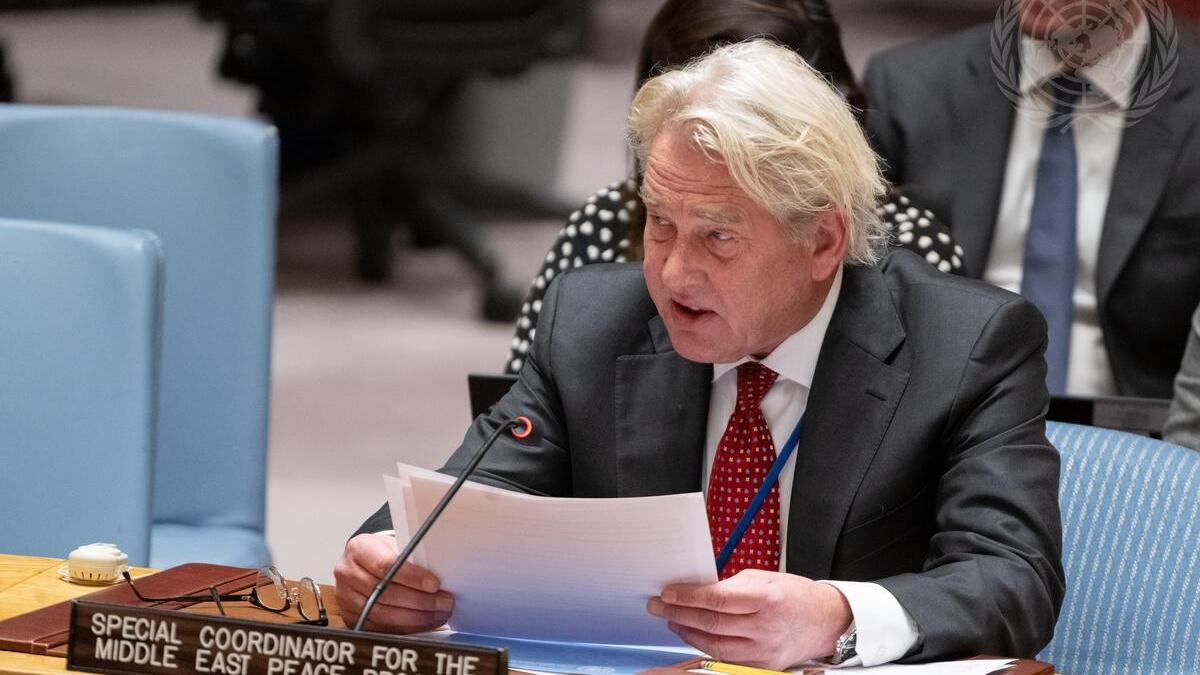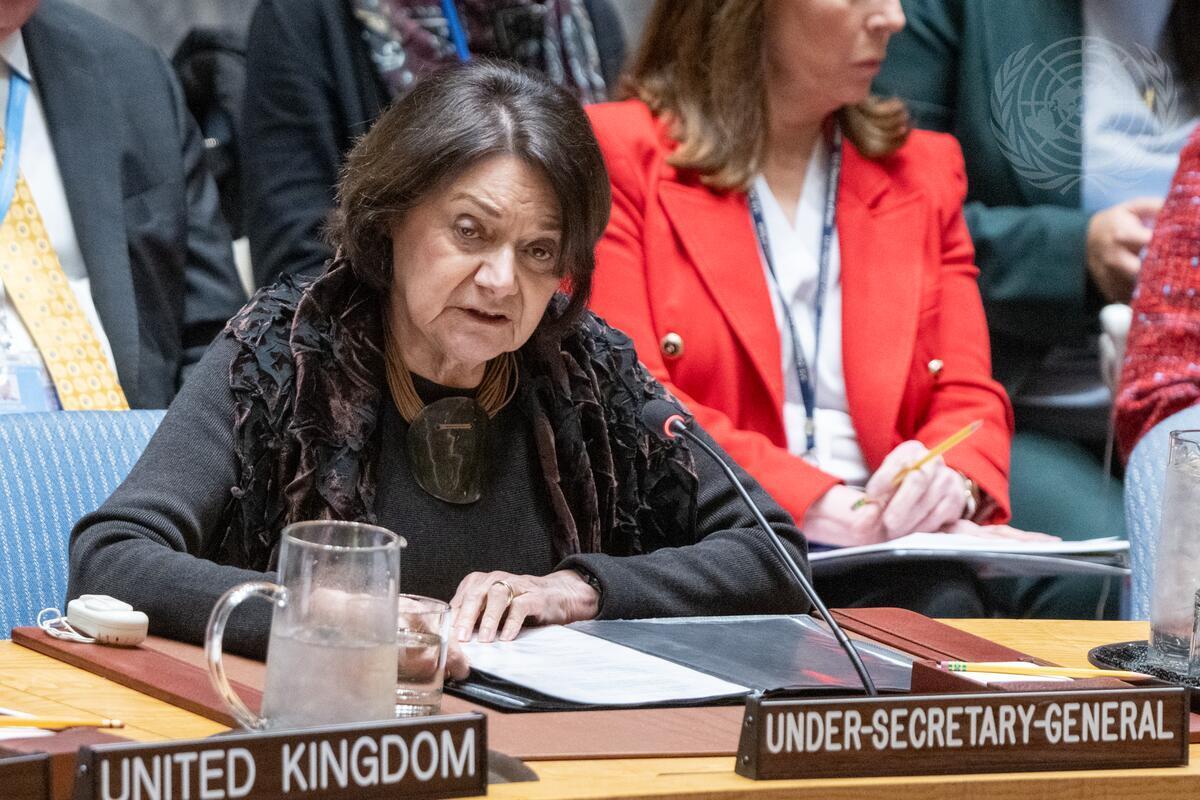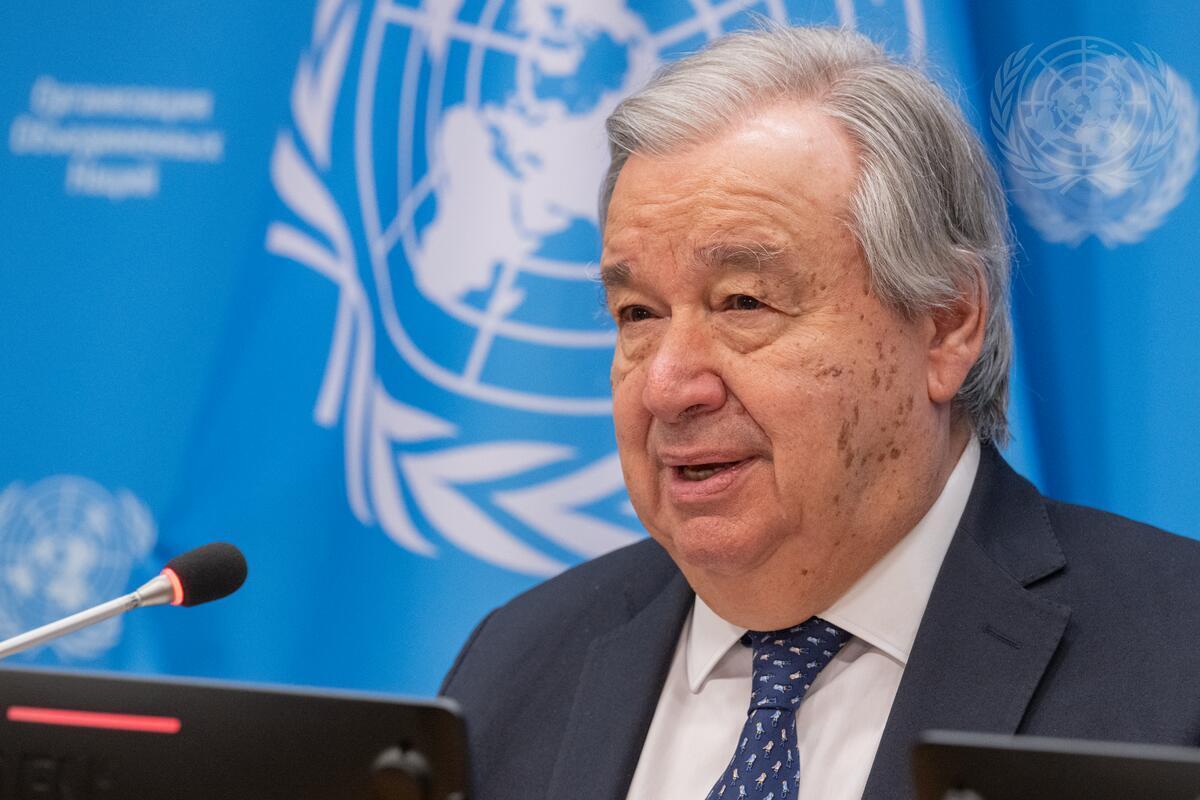Mister President,
Members of the Security Council,
Each month, I brief you in detail on the latest developments on the ground relevant to the Israeli-Palestinian conflict.
Today, however, I wish to provide a broader perspective on the challenges we are facing, while highlighting some potential ways forward for the parties and the international community.
A detailed update on recent incidents and developments will be provided in the forthcoming Report of the Secretary-General on the Implementation of UNSCR 2334 (2016) in December.
Mister President,
After decades of persistent violence, illegal settlement expansion, dormant negotiations and deepening occupation, the conflict is again reaching a boiling point.
High levels of violence in the occupied West Bank and Israel in recent months, including attacks against Israeli and Palestinian civilians, increased use of arms, and settler-related violence, have caused grave human suffering.
This past week I condemned bombings in Jerusalem that killed two Israelis, including a 16-year-old, and injured over a dozen more civilians. Such acts of terrorism must be clearly rejected and condemned by all.
Days before, I condemned a violent attack by Israeli settlers against Palestinians in Hebron that risks aggravating an already tense environment. All have a responsibility to act against extremists and to speak out against such acts of violence and incitement.
Let me reiterate that the targeting of civilians can never be justified, and the violence must stop.
This surge in violence in the Occupied Palestinian Territory is taking place in the context of a stalled peace process and entrenched occupation, and amidst mounting economic and institutional challenges faced by the Palestinian Authority. Global trends and declining donor support have compounded these challenges, alongside an absence of democratic renewal for the Palestinian people.
In Gaza, the fragile calm was recently interrupted by the launching of four rockets towards Israel by Palestinian militants and subsequent airstrikes by Israeli Defense Forces against what it said were Hamas targets. Once again, we are reminded that the mix of militant activity, debilitating closures, absence of the legitimate Palestinian Government and hopelessness create an ever-present risk of escalation.
Mister President,
I remain focused on addressing both the immediate threats to stability and to the longer-term objectives of my mandate.
In the occupied West Bank, my team and I have in recent weeks visited areas where violence has been severe, and I continue to hold discussions with a range of Palestinian and Israeli officials, as well as international and regional actors, to address the dangerous dynamics.
In Gaza, the UN worked closely, again alongside regional and international partners, to mediate and support ceasefires in May 2021and earlier this year. The UN leads the humanitarian response and has helped put in place measures to support Gaza’s economy, including improvements to movement and access in and out of Gaza for people and goods. Critical projects such as providing fuel to the Gaza power plant and cash assistance to more than 100,000 needy families is ongoing and will continue in 2023.
In this regard, progress has been made. Israel has approved the highest number of permits for Palestinians from Gaza to work in Israel since 2007 and the entry of a number of dual-use materials from Israel for the first time in more than a decade. Nevertheless, restrictions and delays continue to negatively impact humanitarian and development efforts, as well as important sectors of the economy, and much more remains to be done.
These preventive and de-escalation measures and diplomatic engagements have helped maintain calm on the ground and provide some space for progress, but without tangible movement on the political track, their benefits are likely to be short-lived.
Mister President,
While it may seem that events on the ground are stuck in a never-ending cycle, the truth is that nothing in this conflict is static. Freezing the conflict or permanently managing it are not viable options.
As violence mounts, settlement expansion and restrictions continue to squeeze the economic and physical space for developing a viable Palestinian State. Meanwhile, demography is moving faster than politics. In a few years exponential population growth in the West Bank and Gaza will it make it increasingly difficult, if not impossible, to manage the economic, political and security situation.
The Palestinian Authority is already facing significant institutional and financial challenges. Palestinians have not voted in general elections since 2006. More than 50 per cent of the electorate - those 18 to 35 - has never had the chance to make their voices heard by the ballot.
This is taking place against the backdrop of changing dynamics in the region, shifting international priorities, and more recently, the fallout of the conflict in Ukraine, which have significantly reduced the attention paid to this conflict.
The optimism, hope, and vocal support for a negotiated political solution that were so palpable when the peace process began have now dimmed, especially given the lack of political progress since the unsuccessful rounds of talks in 2007 and 2014. The principles that underpin the Oslo Accords are slipping away.
Political leadership is required to reset a trajectory toward a two-State solution. Failing to address the underlying causes of conflict, as well as the negative trends I just outlined, and without demonstrating a clear political path forward, the conflict will only escalate, causing more bloodshed and misery, and have a deeply destabilizing effect on the entire region. The current trends bring neither stability nor security for anyone.
Mister President,
For these reasons, it is necessary to take urgent steps towards a two-State solution, which still garners considerable support among Palestinians and Israelis. Through incremental but tangible steps, we can build a bridge between where we are now and the conditions necessary for a peaceful resolution of the conflict based on United Nations resolutions, international law and previous agreements.
First, we must continue to engage with the parties to reduce tensions and counter negative trends, particularly those impacting final status issues. This will involve reining in violence and incitement and holding perpetrators accountable. This means that both sides stop unilateral steps that undermine peace, including settlement expansion or legalization, demolitions and displacement. This means upholding the status quo at the Holy Sites, in accordance with the special and historic role of Jordan.
Second, we must continue to improve access, movement and trade to create room for the Palestinian economy to grow. Specifically, steps should be taken to increase access for Palestinians to land and resources in Area C of the West Bank, enabling crucial Palestinian development, and to increase permits for Palestinians to work in Israel.
In Gaza, a further and more comprehensive approach to easing restrictions on the movement of people and goods is needed. Re-linking the economy of Gaza to the West Bank should be a related, critical objective. Ultimately, ending the debilitating closure and addressing Gaza’s challenges require political solutions in line with UNSCR 1860 (2009).
Third, efforts are needed by all parties and the international community to strengthen Palestinian institutions, improve governance and shore up the fiscal health of the Palestinian Authority. The PA’s political legitimacy and accountability must also be strengthened through democratic reforms and opening of the civic space, holding elections across the OPT and ensuring the effectiveness and credibility of the Palestinian security forces. Without implementing points one and two above, this will not be possible.
These steps seek to enable the parties to move past ad-hoc efforts focused on security and economic matters, and towards meaningful engagement on more fundamental political issues. While they are intended to have immediate, concrete benefits for Palestinians and Israelis, these priorities are anchored to a broader political framework that advances us towards two States.
Mister President,
I recognize that under the current circumstances, advancing such steps will be a formidable task. Fundamental issues need to be addressed by the parties. A common approach where the two-State solution is the guiding political direction is essential to halting the current negative trajectory.
It will require a redoubled commitment from the international community, as well as coordinated and sustained attention, resources and engagement with the parties, despite the global challenges.
Clearly, circumstances have changed in the three decades since Israelis and Palestinians first embarked on the peace process. Neither can turn away from the realities of geography and demography that are reshaping the landscape, which, when combined with [fast] expanding settlements east of the 1967 lines, reflects an increase in friction points and a deepening conflict.
Such a direction has full support from the international community. In this regard, the United Nations, plays a critical role in anchoring and affirming the international consensus on how this conflict will ultimately be resolved: the establishment of two States, living side-by-side in peace and security, on the basis of the 1967 lines, in line with UN resolutions, international law and previous agreements.
This consensus is based on the recognition that both Palestinians and Israelis have deep national, religious, cultural and historic ties to their homeland, and that both have a right to self-determination in the form of a viable, contiguous, independent State of their own.
Ultimately, only Palestinians and Israelis can together determine their future. But the UN and the international community – including through regional and international frameworks – must support the parties in moving towards a political horizon aligned with the core principles outlined above.
Despite the bleakness of this moment, and in fact because of it, I encourage all of us to recommit to this ambitious but achievable goal.
Thank you.






